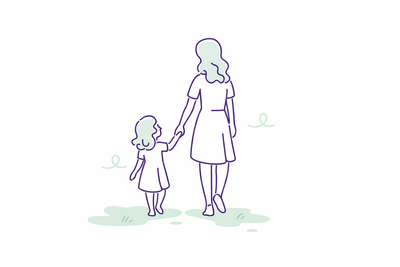
Let's talk again about the NOs we say to our children. Let's talk about their hysterical reactions when we say them.
Most NOs we say to our kids are a product of the way we were raised and we often say them because we believe that children should be able to comply with behavioural rules decided by a society that rewards immobility: the more a child is still and silent, the better-behaved he is. The more they move and can't control their instincts (aka the more they're normal children) the more parents are at the mercy of judgments and pointed fingers. This mentality is a huge failure of our society. And I decide not to accept it.
The other day we were at the restaurant and two ladies told me that I did "an excellent job" as a mother, because Oliver and Emily sat at the table the whole time, ate and then started drawing quietly on their tablets. I smiled, but it annoyed me, because people are as fast at thinking and expressing a positive judgment, as they are at thinking and (not) expressing a negative one. I said "thank you", but hadn't I been tired and had the music been lower, I would have said what I usually say.
That it hasn't always been like this, and sometimes it still isn't. That my children spent thousands of hours in restaurants: it's no longer new to them so they can behave like they would at home. That society should reflect on what we consider indicators of children's good behavior, because being quiet and still is definitely not one of them. But above all that the indicators of my success as a mother are very different: that my children feel calm, listened to, respected, trusted—this makes me feel successful as a mother.
Can we avoid the power struggle at the restaurant?
Let's imagine a scene at a place where I notice parents say many NOs: the restaurant. A 2.5-year-old child runs around the tables at the restaurant, the parents says no, the child insists, the parent sits him down, the child cries hysterically. Could the power struggle and the tears be avoided? Yup.
By choosing a suitable restaurant, with a play area, colours, a board game. In such a place, a parent doesn't feel the pressure and is more likely to remain calm.
By remembering that it's normal that children don't want to sit at the table, their nature is activity, not immobility (although society would like parents to believe differently).
By starting with our example at home: if we get up all the time to go get food in the kitchen, how can we ask our children not to do the same?
By offering opportunities to practice this skill: if we never take our kids to a restaurant, we can't possibly hope they'll magically know how to behave just because they behave at home.
By ignoring the judgements of a society that doesn't understand children, by thinking about our children's needs and offering them alternatives: "You can run around OUR table. You can go under the table as if it were a tunnel".
By involving them and spending time with them during the meal, reading a book and playing with them instead of just talking to our friends: if we parents haven't chosen a kid-friendly restaurant, it's not our children's fault.
By going out with friends who understand all this and are supportive and helpful: friends who say "at his/her age, s/he should sit at the table", at their age should know that judging anybody (especially a child) based on a single occasion is wrong and disrespectful.
By understanding when it's time to get up and go for a walk, without holding a grudge, without anger, without "here we go, I can never enjoy a meal": if we expect our toddlers to sit at the table, we're setting everybody up for failure.
How to help children succeed in the restaurant
This is not to say that children are not able to sit at the table over a meal: Oliver and Emily do it most of the times. But if we want them to learn and succeed, we must give them the tools and the opportunities to succeed:
- Let children learn at their own pace, with no unnecessary NO, without threats or punishments: it's a process, why not make it pleasant for everybody?
- Set expectations right: if we take our children to a restaurant they're not familiar with, the only thing we should expect is that they will need even more help, love and understanding;
- Choose a kid-friendly restaurant, with toys, books for children or on the beach, where the expectations of the other customers are also set right;
- At the beginning, choose always the same restaurant, which creates familiarity with both food and the environment: in every new place, toddlers learns from scratch;
- Mom and dad take turns: dad looks after the children for half the lunch and mom for the other half. Or mom is responsible one day and dad the other day: this way, one of the two parents is always 100% present for their friends and the other 100% present for their children;
- Lower the volume of your inner voice that he says "everyone is looking at you". Whoever judges a parent of a two-year-old who runs around the tables doesn't have the faintest idea of how children develop;
- Letting kids learn naturally is great, but we should always be respectful of other people: they have the right to enjoy their meal, too. If we have decided to take our toddlers to a non-kid-friendly restaurant, it's our responsibility to make sure they don't bother other customers, by playing with them and creating a positive experience for everybody involved.
Parliamone
Grazie Carlotta leggere il tuo blog è’ un vero insegnamento proprio durante queste vacanze io e mio marito stiamo sperimentando questo con il nostro bimbo di due anni lui è’ molto vivace e attivo e spesso noi ci sentiamo falliti come genitori perché i bambini etichettati bravi sono quelli che non corrono che non urlano che stanno seduti composti,oltre che ora dal niente a volte da qualche piccola botta agli altri bimbi dal niente o quando gli vietiamo qualcosa ci pizzica o ci da qualche schiaffo..
































